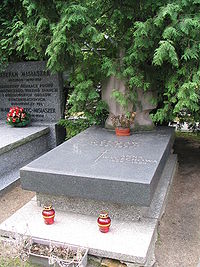- Czesław Wycech
-
 Czesław Wycech
Czesław Wycech
Czesław Wycech (1899 – 1977) was a Polish activist, politician and historian. He was a member of the Polish peasant's parties: the Polish People's Party "Wyzwolenie", the People's Party, the Polish People's Party, and the United People's Party. During World War II he was a member of the Polish Underground State, responsible for organizing underground education. He was the Minister of Education in the Council of National Unity (1945-1947). Within the People's Republic of Poland, he was a member of the Polish parliament (Sejm) and also held other governmental posts.
Biography
Wycech was born to a peasant family on July 20, 1899 in Wilczogęby. A teacher by profession, he graduated from the Teacher's Institute in Warsaw in 1926. He was involved with the peasant movement from around 1917 to 1919;[1][2] around that time he joined the Polish People's Party "Wyzwolenie" (PSL "Wyzwolenie") and in 1931, the People's Party (SL).[1][2][3] He joined the Polish People's Party (PSL) post-World War II in 1945 which by 1949 had become the United People's Party (ZSL). From 1946 until 1971 he was one of the top leaders of PSL and ZSL.[3]
Wycech was an educational activist; during World War II he was an important participant in the underground education in occupied Poland.[3] He was one of the founders of the Secret Teachers Society (Tajna Organizacja Nauczycielska) in 1939; he later became a member of the Polish Underground State and he was the President of the Department of Culture and Education in the Government Delegation for Poland from 1940 until 1945.[2] He was the President of the Association of Polish Teachers (ZNP) from 1944 until 1945 and from 1945 to 1947, he was the Minister of Education in the Council of National Unity.[3]
He was a deputy chairman of the Polish Council of State from 1956 until 1957.[3] From 1944 to 1971 he was member of the Polish parliament (Sejm, earlier the State National Council).[2] From 1957 to 1971 he was the Marshal of the Sejm.[2][4]
In 1959 he was decorated with the Order of the Builders of People's Poland for his contributions to peasant studies, development and education.[2]
Works
- Nauczycielstwo w walce o demokrację (1947)
- Materiały do dziejów ruchu ludowego (1949)
- Z przeszłości ruchów chłopskich, 1768-1861 (1952)
- Ks. Piotr Ściegienny (1953)
- Powstanie chłopskie w roku 1846 (1955)
- 60 lat ruchu ludowego (1957)
- Podstawowe zagadnienia społeczno-polityczne ruchu ludowego (1958)
- Polityczna myśl ludowa w świetle programów stronnictw chłopskich (1959)
- Aktualne zadania polityczne i organizacyjne zjednoczonego Stronnictwa Ludowego (1962)
- Społeczna gospodarka rolna w polskiej myśli politycznej (1963)
- Z dziejów tajnej oświaty w latach okupacji 1939-1945 (1964)
- Wincenty Witos w świetle własnej twórczości pisarskiej (1966)
- Towarzystwo Oświaty Demokratycznej «Nowe Tory» 1931-1939 (1966)
Notes
- ^ a b Jerzy Jan Lerski, Piotr Wróbel, Richard J. Kozicki, Historical Dictionary of Poland, 966-1945, Greenwood Publishing Group, 1996, ISBN 0313260079, Google Print, p.667
- ^ a b c d e f (Polish) Czesław Wycech 1899-1977, Muzeum Historii Polskiego Ruchu Ludowego
- ^ a b c d e (Polish) Wycech Czesław in WIEM Encyklopedia
- ^ George Sanford, Democratic Government in Poland: Constitutional Politics Since 1989, Macmillan, 2002, ISBN 0333774752, Google Print, p.109
Sejm Marshals of the People's Republic of Poland Władysław Kowalski • Jan Bohdan Dembowski • Czesław Wycech • Dyzma Gałaj • Stanisław Gucwa • Roman Malinowski • Mikołaj KozakiewiczCategories:- 1899 births
- 1977 deaths
- People from Węgrów County
- Polish People's Party "Wyzwolenie" politicians
- People's Party (Poland) politicians
- United People's Party (Poland) politicians
- Polish writers
- Recipients of the Order of the Builders of People's Poland
- Members of the Sejm of the People's Republic of Poland (1961–1965)
- Members of the Sejm of the People's Republic of Poland (1965–1969)
- Members of the Sejm of the People's Republic of Poland (1969–1972)
Wikimedia Foundation. 2010.

